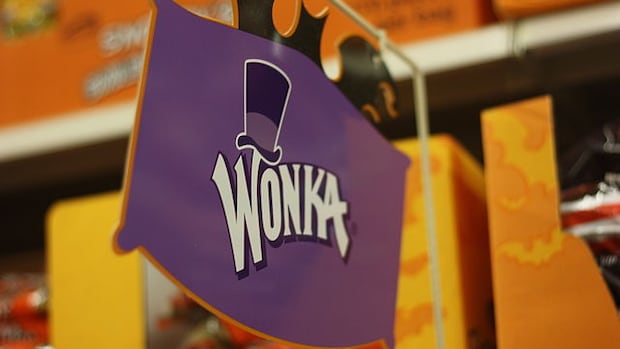The Willy Wonka Secret: Candy Bar Advertising
When writer Roald Dahl was a young schoolboy in England, he lived near a Cadbury chocolate factory.
Every once in a while, Cadbury would come up with a new chocolate concoction, and give out free samples to local kids to see if they liked them. That memory stayed with Dahl, and years later in 1964, he published a book titled Charlie and the Chocolate Factory. Seven years after that, the book was adapted into a movie. It was titled, Willy Wonka & the Chocolate Factory.
So, why was the title changed?
If you've ever watched Willy Wonka & the Chocolate Factory, you may have missed one line in the opening credits. In small type, it says the movie's copyright is held by Wolper Pictures Ltd. and the Quaker Oats Company.
Now, why would a food company own the copyright to a Hollywood movie? Well, it all started with the director's 11-year-old daughter. She had read Charlie and the Chocolate Factory and loved it. Then asked her father to make a movie out of it. The director wasn't sure, so he passed the idea by producer David Wolper.
At that moment, Wolper was doing a project for Quaker Oats, and he knew Quaker wanted to get into the candy business. So Wolper told Quaker Oats it should fund the movie. The plot revolved around Wonka Candy Bars – and since the film would run in theatres across the country, Quaker could launch their candy bars at the same time. Plus, the company would earn part of the movie's profits.
Quaker Oats liked the concept, and put up the full $3 million production budget. But the company had one stipulation: Quaker insisted the title be changed. The company wanted to start manufacturing Willy Wonka-branded candies and candy bars. So they wanted the title changed from Charlie and the Chocolate Factory to Willy Wonka & the Chocolate Factory.
Paramount Studios and Wolper agreed to the change. Roald Dahl wasn't happy. Gene Wilder was cast as Willy Wonka. Dahl had wanted Spike Milligan. It also became a musical, which Dahl also disliked.
One of the main songs in the movie was "The Candy Man." Singer Sammy Davis Jr. was down on his luck in the early '70s, needed some money, and his manager convinced him to cover "The Candy Man."
Sammy hated the song, banged off two quick takes, and said, "This record is going straight into the toilet. Not just around the rim, but into the bowl, and it may just pull my whole career down with it."
It would turn out to be his only Home hit.
Meanwhile, Quaker Oats was having problems with its Willy Wonka candy bars. As it turned out, Quaker couldn't get the recipe right for its Willy Wonka candy. It kept melting, even in cool temperatures. The company was forced to eventually pull the candy from the shelves. Therefore, their promotional investment in the movie was all for nothing. The movie got some good reviews, but did poorly at the box office. So Quaker's dreams of big profits evaporated.
The film languished, unseen for six years. When the rights lapsed in 1977, Paramount declined to renew. Quaker Oats had no use for the movie either, and unloaded the rights to Warner Brothers for $500,000. But, the 1980's saw the rise of the VCR. And video rentals of Willy Wonka suddenly flew out of Blockbuster stores.
The movie that Roald Dahl disowned, the movie that didn't make a profit, the movie that Paramount didn't want and Quaker didn't need, ended up becoming a cult classic.
.png)





Comment